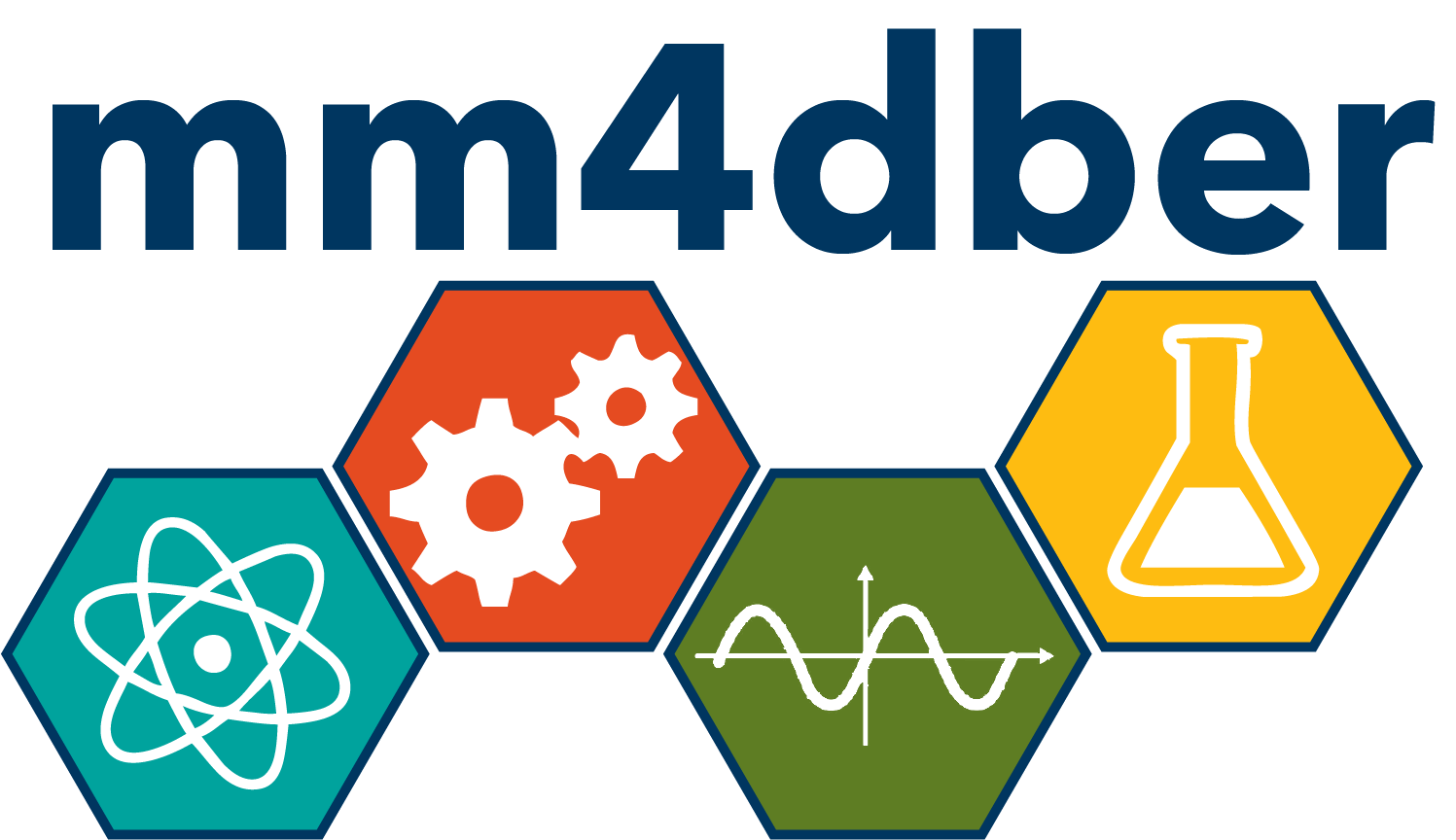MM4DBER
MM4DBER Pre-Training Materials


Mixture Modeling for Discipline Based Education Researchers (MM4DBER) is an NSF-funded training grant to support STEM Education scholars in integrating mixture modeling into their research.
Day 1 (August 31, 2023): Introductions, training goals, introduction to mixture modeling
Learning Outcomes:
- Identify why research goals and aims (not research questions) are more appropriate for mixture models
- Create a first draft of your equity-focused research goals that can be addressed with mixture modeling
- Identify how the MM4DBERs training goals and opportunities can help you to address your research goals
Synchronous Activity:
Asynchronous Activity:
-
Activity 1: Create a draft of your research goals (starting on slide 9 of the Workspace
-
Activity 2: Install: R, RStudio, MPlus, MplusAutomation, R-packages
-
Install R/Rstudio: HERE you will find a guide to installing both R and RStudio.
- Install Mplus: HERE
- Install MplusAutomation: HERE
-
Note: You should have received a copy of Mplus for use during the one-year training (requires a paid license).
- Install packages & practice creating Rproject: Watch these tutorial videos which introduce R & Rstudio and walk through how to install and load packages
- HERE - Intro to R video tutorial (Covered in first 7 minutes)
- HERE - Intro to MplusAutomation video tutorial (Covered in first 12 minutes)
NOTE: It is highly recommended that you watch the full videos before day 5 of pre-training. Especially for those who are learning R/Rstudio.
If you need help, drop into office hours. Book an appointment HERE
Anonymous Feedback Survey: Day 1
“Parking Lot” document with questions and answers HERE
Day 2 (September 1, 2023): Introduction to Mixtures
Learning Outcomes:
- Identify the advantages of using mixture modeling
- Construct a person-centered research goal in a research topic that you are interested in
Synchronous Activity:
Asynchronous Activity:
- Activity 1: Linking theory to your person-centered research goal (starting on slide 34 here)
- Activity 2: Read mixture modeling article (starting on slide 47 here)
Anonymous Feedback Survey: Day 2
Day 3 (September 2, 2023): Introduction to Latent Class Analysis
Learning Outcomes:
- Construct a path diagram for mixture models
- Connect research goals and theory to a path diagram
Synchronous Activity:
Asynchronous Activity:
- Read mixture modeling artice from Day 2, activity 2. Using the workspace slide deck, answer questions related to the article. We will discuss these at the start of day 4.
- To help with the review of logistic regression, watch these videos:
- Odds Ratio Review Video
- Chi Square Test Review Video
- Conditional Probabilities and Contingency Tables
Anonymous Feedback Survey: Day 3
Day 4 (September 7, 2023): Review of Logistic Regression
Learning Outcomes:
- Identify why it is relevant to use logistic regression in mixture modeling
- Understand the relationship between logits, odds ratios, and probabilities in the context of logistic regression
- Interpret results of logistic regression
- Identify the importance of multinomial logistic regression in the context of LCA (What is it & why do we care?)
Synchronous Activity:
- Slide deck here
- Fermant et al. (2021) article
- Workspace here
Asynchronous Activity:
- Activity 1: Interpret logistic regression output from Mplus output file - Slide 17 Workspace
- Activity 2: Review videos explaining odds ratios, conditional probabilities, and chi square tests (Optional; as needed) - Slide 29 Workspace
- Video (Multinominal logistic regression, finishing slides we did not get to): Here
- Video - Synchronous activity solution (“Activity 2”; not covered in class): Here
Anonymous Feedback Survey: Day 4
Day 5 (September 11, 2023): R, RStudio and MplusAutomation
Learning Outcomes:
- Using Mplus software, fellows the basic skeleton of a Mplus input (.inp) syntax, run basic descriptive statistics, and evaluate output (.out)
- Run descriptive statistics in R using the
MplusAutomationpackage - This workshop will cover the creation of R-projects and R markdowns and discuss the benefits of organization of the R workflow.
Preparation:
- Instal R, Mplus, and RStudio
- Watch videos (if you haven’t already): Intro to R , Intro to MplusAutomation
Synchronous Activity:
Asynchronous Activity:
- Activity 1: Practice with R/R Studio, Mplus and MplusAutomation - Slide 3 Workspace
- Activity 2: Identify and share an article on mixture modeling - Slide 5 Workspace
Resources:
Anonymous Feedback Survey: Day 5
Helpful Links:
- Please visit our website to learn more.
- Visit our GitHub account to access all the MM4DBER materials.
- Follow us on Twitter!
